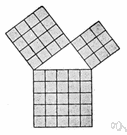theorem
(redirected from Theorems)Also found in: Thesaurus, Medical, Encyclopedia.
Related to Theorems: Sylow theorems
the·o·rem
(thē′ər-əm, thîr′əm)n.
1. An idea that has been demonstrated as true or is assumed to be so demonstrable.
2. Mathematics A proposition that has been or is to be proved on the basis of explicit assumptions.
[Late Latin theōrēma, from Greek, from theōrein, to look at, from theōros, spectator; see theory.]
American Heritage® Dictionary of the English Language, Fifth Edition. Copyright © 2016 by Houghton Mifflin Harcourt Publishing Company. Published by Houghton Mifflin Harcourt Publishing Company. All rights reserved.
theorem
(ˈθɪərəm)n
(Logic) maths logic a statement or formula that can be deduced from the axioms of a formal system by means of its rules of inference
[C16: from Late Latin theōrēma, from Greek: something to be viewed, from theōrein to view]
theorematic, theoremic, theorematical adj
ˌtheoreˈmatically adv
Collins English Dictionary – Complete and Unabridged, 12th Edition 2014 © HarperCollins Publishers 1991, 1994, 1998, 2000, 2003, 2006, 2007, 2009, 2011, 2014
the•o•rem
(ˈθi ər əm, ˈθɪər əm)n.
1. Math. a theoretical proposition, statement, or formula embodying something to be proved from other propositions or formulas.
2. a rule or law, esp. one expressed by an equation or formula.
3. Logic. a proposition that can be deduced from the premises or assumptions of a system.
4. an idea, method, or statement generally accepted as true or worthwhile without proof.
[1545–55; < Late Latin theōrēma < Greek theṓrēma spectacle, object of contemplation, theorem =theōrē-, variant s. of theōreîn to observe, derivative of theōrós person sent to consult an oracle, spectator + -ma resultative n. suffix]
the`o•re•mat′ic (-əˈmæt ɪk) adj.
Random House Kernerman Webster's College Dictionary, © 2010 K Dictionaries Ltd. Copyright 2005, 1997, 1991 by Random House, Inc. All rights reserved.
the·o·rem
(thē′ər-əm, thîr′əm) A mathematical statement whose truth can be proved on the basis of a given set of axioms or assumptions.
The American Heritage® Student Science Dictionary, Second Edition. Copyright © 2014 by Houghton Mifflin Harcourt Publishing Company. Published by Houghton Mifflin Harcourt Publishing Company. All rights reserved.
ThesaurusAntonymsRelated WordsSynonymsLegend:
Switch to new thesaurus
| Noun | 1. |  theorem - a proposition deducible from basic postulates theorem - a proposition deducible from basic postulatesbinomial theorem - a theorem giving the expansion of a binomial raised to a given power proposition - (logic) a statement that affirms or denies something and is either true or false |
| 2. | theorem - an idea accepted as a demonstrable truth idea, thought - the content of cognition; the main thing you are thinking about; "it was not a good idea"; "the thought never entered my mind" Bayes' theorem - (statistics) a theorem describing how the conditional probability of a set of possible causes for a given observed event can be computed from knowledge of the probability of each cause and the conditional probability of the outcome of each cause |
Based on WordNet 3.0, Farlex clipart collection. © 2003-2012 Princeton University, Farlex Inc.
theorem
noun proposition, statement, formula, rule, principle, thesis, hypothesis, deduction, dictum He postulated a theorem and proved it.
Collins Thesaurus of the English Language – Complete and Unabridged 2nd Edition. 2002 © HarperCollins Publishers 1995, 2002
theorem
nounA broad and basic rule or truth:
The American Heritage® Roget's Thesaurus. Copyright © 2013, 2014 by Houghton Mifflin Harcourt Publishing Company. Published by Houghton Mifflin Harcourt Publishing Company. All rights reserved.
Translations
نَظَرِيَّه
teorém
læresætning
elméleti tétel
setning
teorema
teorēma
teoréma
davateorem
Collins Spanish Dictionary - Complete and Unabridged 8th Edition 2005 © William Collins Sons & Co. Ltd. 1971, 1988 © HarperCollins Publishers 1992, 1993, 1996, 1997, 2000, 2003, 2005
Collins English/French Electronic Resource. © HarperCollins Publishers 2005
Collins German Dictionary – Complete and Unabridged 7th Edition 2005. © William Collins Sons & Co. Ltd. 1980 © HarperCollins Publishers 1991, 1997, 1999, 2004, 2005, 2007
Collins Italian Dictionary 1st Edition © HarperCollins Publishers 1995
theorem
(ˈθiərəm) nounespecially in mathematics, something that has been or must be proved to be true by careful reasoning. a geometrical theorem.
Kernerman English Multilingual Dictionary © 2006-2013 K Dictionaries Ltd.